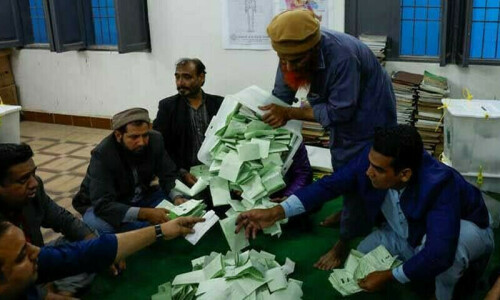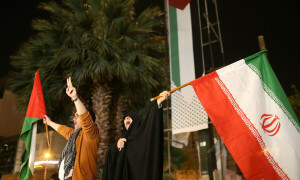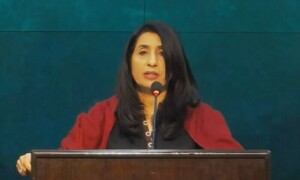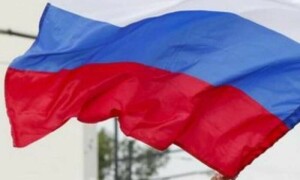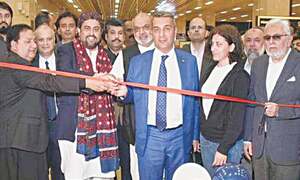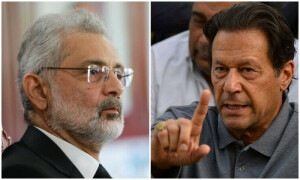
ISLAMABAD: During his first interaction with the parliamentary leaders of key political parties through a video link after the outbreak of coronavirus in the country, Prime Minister Imran Khan on Wednesday stressed the need for fighting the pandemic collectively and said he was ready to get input from all the parties.
“We are ready to get an input from all of you. I want that we should win this war collectively. When we will win this war, it will be the victory of Pakistan, all provinces and all the political parties,” the prime minister said in his opening remarks.
However, despite these positive remarks by the prime minister, the meeting convened by National Assembly Speaker Asad Qaiser to discuss the prevailing situation in the country due to spread of coronavirus, ran into disarray as Pakistan Muslim League-Nawaz (PML-N) president Shahbaz Sharif and Pakistan Peoples Party (PPP) chairman Bilawal Bhutto-Zardari boycotted the proceedings when the prime minister abruptly left the meeting after making opening speech and without listening to the other participants.
Shahbaz, Bilawal boycott video meeting when Imran abruptly leaves after making opening speech
Before walking out of the meeting, Mr Sharif, who was attending the video conference from his Lahore residence, regretted that the “level of seriousness of the so-called prime minister can be gauged from the fact that he didn’t even care to listen to leaders of the opposition at a time when the country is fighting the biggest pandemic”.
“We had come to talk. We had not come to do politics. We had come to discuss as to how we can utilise all our energies to meet the challenge. If this is the measure of commitment of the prime minister, then I am sorry, we will not sit in the meeting,” Mr Sharif declared before signing off the video link.
PPP chairman Bhutto-Zardari, who was attending the video conference from Karachi, also left the meeting in protest.
Other representatives of the two parties, however, attended the meeting which continued for more than three hours.
Foreign Minister Shah Mehmood Qureshi, who was physically present in the meeting held at the Parliament House, termed Mr Sharif’s walkout uncalled for. He said the government acknowledged the fact that Mr Sharif had returned to the country from London to play his role. “But what message do you want to give to the nation by staging a walkout from the very first meeting?” he asked.
Mr Qureshi requested the opposition leader to show a big heart and come back to the committee, but his request was not entertained.
Later, the PPP chairman, while addressing a news conference also through a video link, lamented the prime minister for his “ill-mannered and non-serious attitude”, regretting that the prime minister was not ready to get an input from political parties in a time of crisis.
Mr Bhutto-Zardari said that in the past too, the prime minister had never made any effort to develop a national consensus on any issue, including Kashmir, economy and energy. He appealed to the prime minister to “review his approach” and said it was the job of a country’s chief executive to play a leadership role in a time of crisis.
The PPP chairman was of the opinion that the prime minister was not being provided true facts and figures about coronavirus. He said the prime minister was handling the situation in a casual way without having any realisation about the danger posed by coronavirus all over the world.
He challenged the prime minister’s claim that so far only 153 people out of 900 cases had got the disease through a local contact. He said that out of 148 Covid-19 cases in Karachi, 94 had no history of foreign travel and got it through local transmission which was 60 per cent of the total cases.
The PPP chairman termed the economic package announced by the prime minister “insufficient” and asked the federal government to increase the economic relief to the masses, announce total exemption of utility bills and ensure availability of food and ration for the poor and daily wagers. He was of the view that the government should have announced a 50pc reduction in the prices petroleum products. He said the State Bank should bring the interest rate down to the single digit. He said these were the proposals which he wanted to directly give to the prime minister.
Mr Bhutto-Zardari said no province could handle the situation without the support of the federal government. He once again called for a stricter lockdown in other parts of the country, saying that if it was not done, then the lockdown in Sindh would be of no meaning. How could the lockdown in Sindh succeed if similar steps were not taken by Punjab and Khyber Pakhtunkhwa and if people continued to travel across the country, he wondered. He asked the prime minister to meet the demands made by the Sindh chief minister from the federal government.
The PPP chairman, however, did not respond to a question if his party wanted imposition of curfew all over the country. He simply said the problem was that the federal government did not consider coronavirus a real threat and it was taking it lightly by constantly telling the people that 90pc of the affected people recovered from it.
Later, PML-N information secretary Marriyum Aurangzeb said in a statement that both Shahbaz Sharif and Bilawal Bhutto-Zardari listened to the entire speech of the prime minister in good faith for the nation. After the speech, Mr Sharif asked the NA speaker if the prime minister was still present in the meeting to which the speaker replied that he had left. Therefore, she said, the opposition leaders were left with no choice but to walk out of the meeting.
Earlier, Prime Minister Imran Khan briefed the parliamentary leaders on the measures taken by the government since the outbreak of coronavirus in the Chinese city of Wuhan in December last year, particularly after the arrival of Zaireen (pilgrims) from Iran via Taftan border. He gave an overview of the government’s response to Covid-19, including establishment of a quarantine centre and a makeshift screening facility at Taftan – a remote area located 700km from Quetta.
“The government alone cannot fight and win this war against coronavirus. We can win this war together,” the prime minister said, adding that the PML-N had governments in Gilgit-Baltistan and Azad Kashmir and the PPP in Sindh and, therefore, the government and opposition parties should sit together and take decisions to fight the deadly virus effectively.
He said the government’s decision not to bring Pakistani students back from Wuhan despite the pressure from parents and the media was difficult, but it went well as not a single case was reported in the country from China. He said that since Iran did not have the capacity like that of China to tackle Covid-19, Pakistan had to agree to bring the pilgrims back through Taftan border.
The prime minister said that though he was opposed to the idea of complete lockdown for certain reasons, the provinces of Sindh, Balochistan, Khyber Pakhtunkhwa and Punjab, which had the authority under the 18th Amendment, subsequently went for lockdowns, including suspension of transport. He once again stated that they should not go for a complete lockdown, adding that suspension of transport could hurt supply chain and cause shortage of essential items, including food and petroleum products. He said that with Gilgit-Baltistan already facing the shortage of petroleum products, suspension of transport could also affect the vital economic activities like harvesting of wheat crop and industrial production and cause unemployment. He said the government had to intervene to get the ports opened on Tuesday after the supply of pulses stopped due to their closure.
He was of the view that when decisions were taken under fear and pressure, these affected society and had negative fallout. He said that all issues, including lockdown and suspension of transport, would be discussed at a meeting of the National Coordination Committee to be held on Thursday (today).
The prime minister said that if Pakistan had to go for a complete lockdown and curfew, the government would have to supply food to people at their doorsteps, especially those living in slum areas. He said he would soon announce a programme of volunteers who would work for supplying food to people at their doorsteps.
The meeting was attended by federal ministers Asad Umar, Sheikh Rashid Ahmad, Shah Mehmood Qureshi, Pervez Khattak, Dr Fehmida Mirza and Ali Mohammad Khan, Senate Deputy Chairman Saleem Mandviwala, Leader of the House in the Senate Shibli Faraz, MNAs Khawaja Asif, Raja Pervez Ashraf, Shahzain Bughti and Shahida Akthar Ali, Senators Mushahidullah Khan, Sherry Rehman, Anwarul Haq Kakar, Barrister Mohammad Ali Saif, Maulana Abdul Ghafoor Haideri, Usman Kakar, Aurangzeb Khan and Sitara Ayaz.
Special Assistant to the Prime Minister on Health Dr Zafar Mirza and National Disaster Management Authority Chairman Lt Gen Mohammad Afzal briefed the participants on the steps the government had already taken to deal with the situation.
NA Speaker Asad Qaiser in his opening remarks said the purpose of this parliamentary discourse was to collectively brainstorm and forge policy guidelines for the government to tackle the pandemic and its aftermath.
According to an official handout issued by the NA Secretariat, there was a general consensus that the fight against coronavirus could be won through collective efforts. They were of the view that doctors and paramedics were vulnerable as they were on the forefront and, therefore, they may be equipped properly. The participants also suggested taking care of the vulnerable and marginalised segments of society through government schemes for social protection.
Foreign Minister Qureshi, while addressing the concluding session, said the government was fulfilling its obligations in coordination with the provincial governments. He, however, said that positive criticism would help the government to better deal with the situation.
The speaker informed the participants that the names from the treasury and opposition benches for a parliamentary committee on coronavirus had been received and the panel would be notified in due course of time.
Published in Dawn, March 26th, 2020


